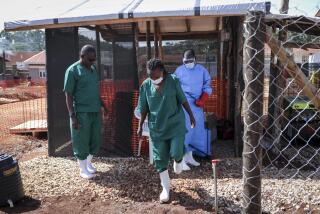Ebola-exposed missionaries returning to North Carolina
- Share via
Missionaries returning to North Carolina after working with or around Ebola patients in West Africa will be quarantined upon their arrival, officials announced Sunday.
SIM USA, a mission organization based in Charlotte, said some of its staffers and their families would be returning from Liberia. Citing concern for their privacy, organization officials did not say how many people would be coming back, when they would arrive or where they would stay.
“No returning SIM USA staff member is sick or has symptoms of Ebola infection,” the mission group said in a statement.
North Carolina public health officials are requiring the people to be quarantined 21 days past their last exposure to the deadly virus.
“This measure is being taken out of an abundance of caution, and it is important to remember that there are no confirmed or suspected cases of Ebola in North Carolina,” the state Department of Health and Human Services and the Mecklenburg County Health Department said in a joint statement.
Andy Fair, a spokesman for Mecklenburg County — which includes Charlotte — told the Los Angeles Times that the plane or planes containing the missionaries and their families certainly would land somewhere in the county. He said he did not know any more details about their arrival.
With Sunday’s announcement, “we were just taking a proactive step this morning to alert residents,” Fair said. “We did it as soon as we learned about it.” He said that “surprisingly,” he had not heard of any concerns from residents so far.
Two Ebola patients are currently being treated in the United States. Dr. Kent Brantly and fellow missionary Nancy Writebol contracted the disease while working with patients in Liberia, and they were moved this month to Emory University Hospital in Atlanta. In a statement written from his isolation unit last week, Brantly said he was “growing stronger every day.”
As of Wednesday, a total of 1,779 Ebola cases, including 961 deaths, have been reported in the African nations of Guinea, Liberia, Nigeria and Sierra Leone, according to the World Health Organization.
There is no vaccine or specific treatment for the Ebola virus, which causes fever, vomiting, diarrhea and massive internal bleeding, and has a fatality rate of 60% to 90%. It is spread through direct contact with the blood, organs or other secretions of infected people.
People who are infected with this hemorrhagic virus experience sudden fever, intense weakness, muscle pain and headaches, along with vomiting and diarrhea. The disease can also cause kidney and liver failure, as well as internal bleeding.
For news about Ebola and more, follow @raablauren on Twitter.
More to Read
Sign up for Essential California
The most important California stories and recommendations in your inbox every morning.
You may occasionally receive promotional content from the Los Angeles Times.














